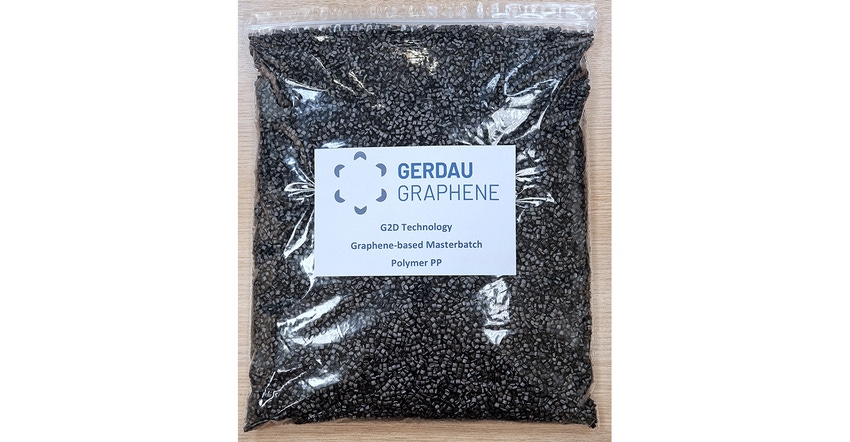Graphene additives also bring a sustainability dividend, according to Brazil’s Gerdau Graphene, which is beginning to roll out the enhanced PP and PE masterbatches.
June 7, 2022

Graphene-enhanced plastics introduced by Brazilian nanotechnology company Gerdau Graphene promise to bring greater overall performance at a reduced cost compared with conventional materials while improving their sustainability footprint.
The new graphene-enhanced masterbatch formulas for polyethylene (PP) and polypropylene (PE) were created in partnership with a government-funded advanced materials center in São Paulo, and are being piloted in a series of industrial applications by Gerdau. The first commercial deliveries are expected in the second half of 2022 in Brazil and will expand to the Americas in 2023.
The presence of additives containing graphene can increase several properties, including stiffness, impact resistance, thermal/electric conductivity, and resistance to degradation, Gerdau Graphene CEO Alex Corrêa told PlasticsToday. “There are many different applications that might benefit from it — flexible and rigid packaging, bottles, automobile parts, plastic furniture, etc. Graphene can also provide process gains, such as facilitating the mixing process due to the reaction effect of carbonaceous fillers, and can also improve productivity in polymer processing, reducing production cycles,” explained Corrêa.
The materials do not require any changes to plastics processing equipment, Corrêa added, although some processing parameters may need to be adjusted to account for increased productivity.
In addition to developing graphene additives for virgin resins, Gerdau Graphene is also working on formulations for post-industrial and post-consumer recycled plastics and polymers, including PP, PE, polystyrene (PS), polycarbonate (PC), and PVC. Each year, the United States produces about eight million tons of PP and 23 million tons of PE, according to figures submitted by Gerdau Graphene. Reducing the amount of raw PP and PE needed to create final plastic products by 30% could save as much as 9.3 million tons of PP and PE plastic from being consumed and ultimately discarded, said the company.
Sustainability, as you may have gathered, is a guiding principle at Gerdau Graphene. “The biggest challenge we face is how to make plastics better by improving material qualities, reducing costs, and increasing sustainability throughout the lifecycle. We are now addressing all of these goals,” said Côrrea in a prepared statement. “By adding specialized graphene additives to thermoplastic recipes, plastic producers can create stronger, more durable plastic products at a fraction of the cost and with far less petroleum and fewer raw materials. Because less plastic is needed for final products, less plastic becomes post-consumer waste. There are also downstream effects, including reductions in manufacturing waste, energy consumption, and transportation. And, circularly, plastics can be recycled into graphene and then reused.”
Given that additives can complicate the recycling process, PlasticsToday asked Corrêa what impact graphene might have.
Graphene, in fact, can be an ally when it comes to sustainability, he replied. “The use of additives containing graphene can prevent polymer degradation during processing, which results in recycled plastics with higher properties, such as impact resistance. This allows for a higher content of recycled plastics in many applications, promoting sustainability.” Polymers containing graphene in their formulation are still recyclable and can be blended with natural or recycled polymers, he added, stressing that the presence of graphene is not an obstacle to recycling. “Also, as graphene can increase some mechanical properties of polymers, the use of additives containing graphene can reduce thickness, meaning that less plastic is needed for the same final application."
Called a miracle material when it was discovered in 2004 and earning its inventors a Nobel prize in chemistry, graphene is considered to be the strongest material on Earth.
Gerdau Graphene and the government-funded EMBRAPII SENAI/SP Advanced Materials Unit are collaborating to leverage the use of graphene in Brazilian industry and increase its global competitiveness in what Gerdau Graphene calls a macro-trend. “The partnership signed at the end of 2021 provides a great opportunity to develop new materials, specifically masterbatches for use in polymers of great industrial applications, highlighting the relevance of graphene to the market,” said Gustavo Spina Gaudencio de Almeida, Technology Coordinator at Instituto SENAI Innovation in Advanced Materials and Nanocomposites.
About the Author(s)
You May Also Like




